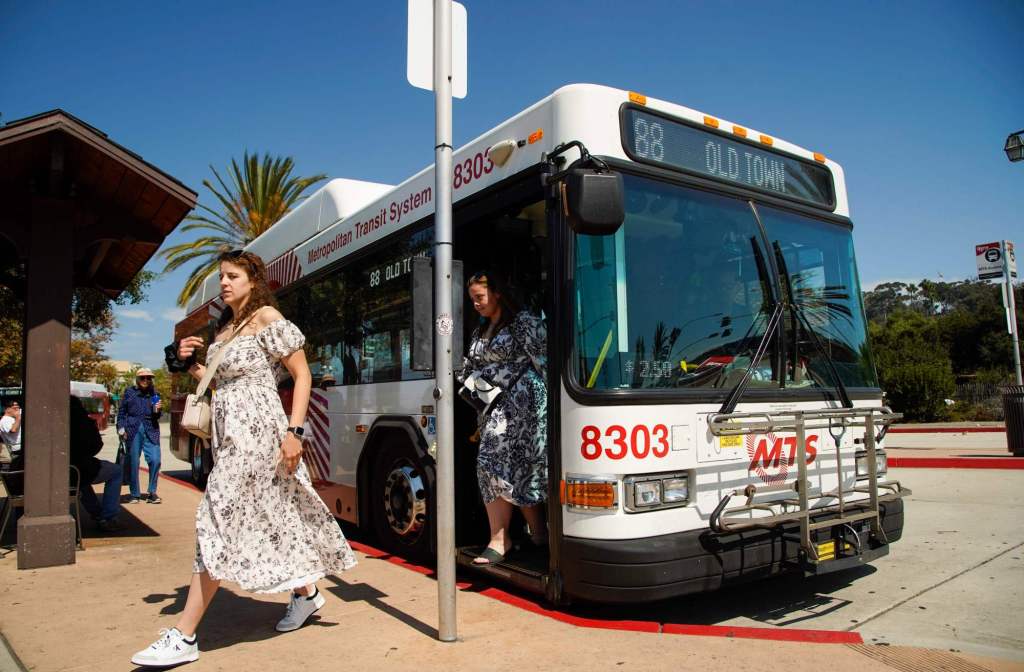A proposal to bring all local public bus service in-house would sharply increase costs compared with continuing to outsource, but the change would likely make buses more reliable and efficient, a new study says.
Bringing bus drivers in-house would also reduce the risk of service interruptions like those caused by a 2023 strike by drivers during a contract dispute, board members for the Metropolitan Transit System say.
The proposal, which was prompted partly by that strike, comes as MTS faces deficits of roughly $100 million per year starting in 2027. But it also comes at a time when better bus services could help MTS with its mission of attracting more riders — especially middle-income and high-income riders.
The North County Transit District, which handles buses and other mass transit north of state Route 56, recently brought all of its bus drivers in-house after years of them working for an outside contractor.
The entire county would have in-house public bus service if NCTD is joined by MTS, which handles buses and other mass transit for all parts of the county south of state Route 56.
It varies nationwide whether transit agencies outsource their bus service or keep it in house.
For example, Las Vegas and Phoenix contract bus service out entirely, while New York and Los Angeles have a hybrid approach, where some bus service is in-house and some is contracted out.
San Diego also uses a hybrid model, with MTS handling about 44% of bus service in-house — mostly city of San Diego neighborhoods — and a contractor handling 56%, primarily in South Bay and East County areas.
It was drivers working for the contractor, TransDev US, who went on strike for five weeks in summer 2023 before ratifying a new contract to end it, after MTS offered some cash for pay raises.
The new study does not include a specific estimate of how much more it would cost MTS to bring bus service in-house, but says it would be substantial.
A specific estimate is expected next month as the consultant, Transportation Management and Design, completes additional analysis.
“While estimated cost impacts were not part of this task and will follow in a later task, this major staffing increase has the potential to significantly increase MTS’s annual operating costs for the same service as compared to what MTS currently pays TransDev,” the report says.
The report says it costs MTS $13.52 in per-mile operating costs to run its bus service, 52% more than TransDev’s $8.87 per-mile operating costs.
A key driver of that difference is pay. Most MTS drivers are paid $36.63 per hour, while most TransDev drivers get between $28.50 and $30 an hour. MTS bus mechanics get $44.63 an hour, while TransDev mechanics get between $36.50 and $42.84.
MTS is projected to spend $128 million on bus operations during the fiscal year that began July 1.
Other drivers of the higher in-house costs would be a larger personnel department. MTS would need to hire an estimated 1,433 drivers, expanding its current workforce of 1,750 by about 82%.
MTS would need to add a total of 56 new administrative positions, including more workers focused on accounting, risk management and workers compensation claims.
But MTS could eliminate a team of workers that oversees TransDev’s contract compliance.
The consultant said MTS provides superior bus service the TransDev based on several criteria.
MTS buses have 1.07 crashes per 100,000 miles, while TransDev buses have 1.38 crashes per 100,000 miles. The average number of miles traveled between mechanical failures is 6,645 for MTS and 6,051 for TransDev.
And perhaps more importantly, TransDev’s number of complaints per 100,000 passengers is nearly twice as high as the transit agency’s — 8.6 for TransDev versus 4.5 for MTS.
After MTS receives cost estimates from the consultant next month for shifting bus service in-house, the board is expected to receive a final report with recommendations in January.
Originally Published: August 12, 2025 at 11:59 AM PDT
